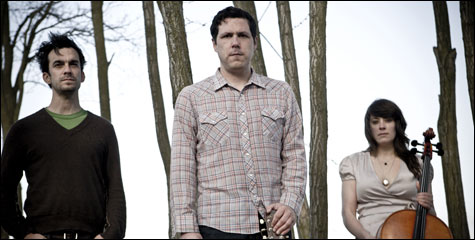
SING LOW Jurado spins weighty tales of love forbidden, unrequited, or betrayed.
|
From Lake Whatcom to Soda Springs, Cave Junction to Bonners Ferry, the Pacific Northwest is littered with abandoned houses left to molder on forgotten lots. Sapped of their color by the elements and the ravages of time, they’re manmade echoes of the forbidding gray skies that enshroud the region so much of the year.

Ignore the long-ago-posted “No Trespassing” signs, step inside the ruins, and you’ll find the skeletal, frequently fire-scarred remains of their innards, branches reaching through gaping holes in the sagging roof. From time to time, you may stumble across fairly well furnished, if fusty, interiors. Torn sofas and weathered appliances from bygone decades. Floors, closets, and counters crammed with the detritus of lives departed — photos of Christmas smiles, holey jackets swaying on wire hangers, tattered utility bills, yellowed newspapers. Sifting through it all can turn the people who once lived there from distant characters in some vaguely imagined “dreams deserted” narrative into actual people.
Then you consider the unanswerables. Why did they leave? What became of them? Were they evicted — sent into the night with little more than the clothes on their backs? Did they die, alone, with no family to pick up the pieces? Or maybe they escaped, leaving a grim existence behind for something better and brighter far away?
It’s that feeling of overwhelming sorrow tempered by the faintest sliver of hope that’s evoked by the music of two veteran Pacific Northwest songwriters and long-time friends who share a bill at Great Scott this Saturday night. Damien Jurado, 35, and Jeremy Enigk, 33, couldn’t be more different. Jurado possesses a weary tenor, a linebacker’s build, a working man’s presence and demeanor, and a 12-year career that’s been largely unheralded outside his native Seattle. Enigk has a soaring falsetto, a slender frame, a rock-star aura despite his everyman appearance, and a widely celebrated history as the former frontman of early-’90s Seattle rock dramatists Sunny Day Real Estate (and, later, short-lived trio the Fire Theft). Yet both meditate on decay, loss, and fragile optimism as they explore the human condition.
Early on, Jurado displayed an affinity for peering into the lives of strangers and distilling their most intimate troubles for public consumption. After his 1997 debut, Waters Ave S., and 1999’s Rehearsals for Departure — two conventional indie-folk albums recorded for Sub Pop on which he offered the stark character sketches that have since earned him repeated comparisons with Raymond Carver — Jurado released Postcards and Audio Letters (2000), a collection of found-sound audio culled from cassettes and answering-machine tapes he’d discovered in trash bins and thrift stores. The pieces range from discomforting to downright distressing. In “Our Kid Is Getting Hurt,” a divorced couple argue over the welfare of their son. “I don’t care what you like,” says “Jim” to his ex-wife. “You know what, you can’t do nothin’ about it, and if you think you can, then go right ahead, because you can’t do jack-dick about it.” Jurado does provide some respite with the sweetly sappy “Hi Dawn, This Is Phil”: “You’re probably on your way over here, but I thought I’d leave you a message anyway, tell ya how much I like ya, how much I care about ya . . . here’s a hug and a kiss from me.”
From there, Jurado’s powerful first-person fictions head down dark paths, letting in only sporadic light, his husky voice spinning weighty tales of loneliness, ennui, and love forbidden, unrequited, or betrayed — accompanied by a plaintive gathering of acoustic and electric guitar, piano, hushed percussion, the occasional voice of a female foil, and sometimes the creak of his chair. There’s no relief in the nocturnal slow-burner “Intoxicated Hands” (“I loved you seven long years/And now that you’ve found me out/Just get out”) or the rueful rumination “Tonight I Will Retire” (“If I should taste fire/Save me not, I deserve to die”). Still, we get reason to believe all is not lost, as in the climax of “Lion Tamer”: “The gun in the drawer/The long-distance call/A story to tell. . . . Save us now before we drown.”
There’s precious little hope, however, in his most recent CD, 2006’s And Now That I’m in Your Shadow. It begins with “Hoquiam,” Jurado wondering amid strings and gently picked guitar, “Was I nothing but a landslide in your mind?”, and grows more morbid from there. “I lost all feeling/And now that I’m in your shadow/I am motionless/I am black,” he intones below desolate cello saws and cymbal crashes on the title track. “Four miles from the highway they found her/Lying in the tall grass by the road/Murdered by the hands of her lover,” he sings in “Shannon Rhodes,” his voice hardly comforted by the lone acoustic strums. Even in the closer — the æthereal “Montesano,” which floats on ambient drones and female coos like some placid Sigur Rós interlude — salvation is questionable at best: “In a landslide I can hear you/Hear you walk away.”